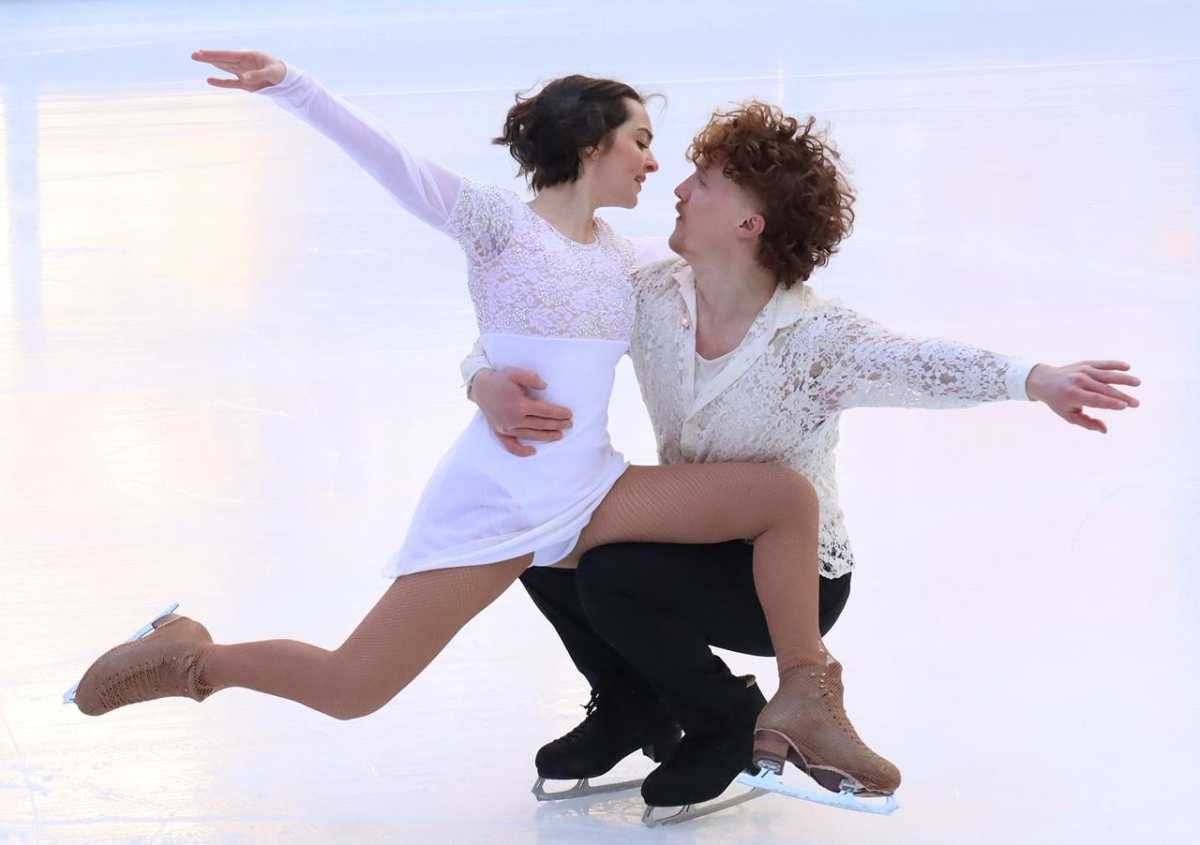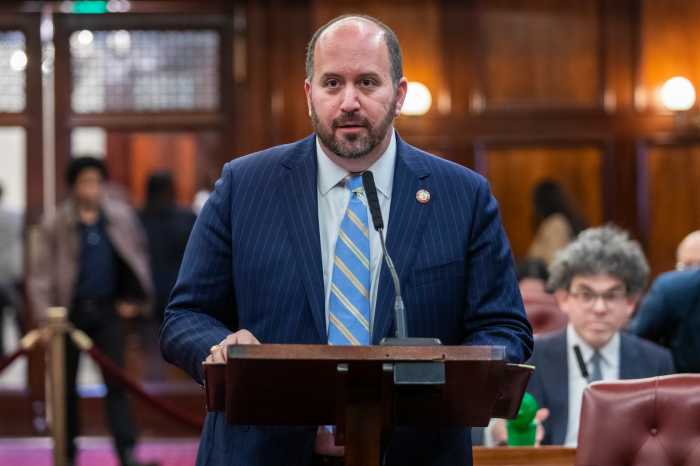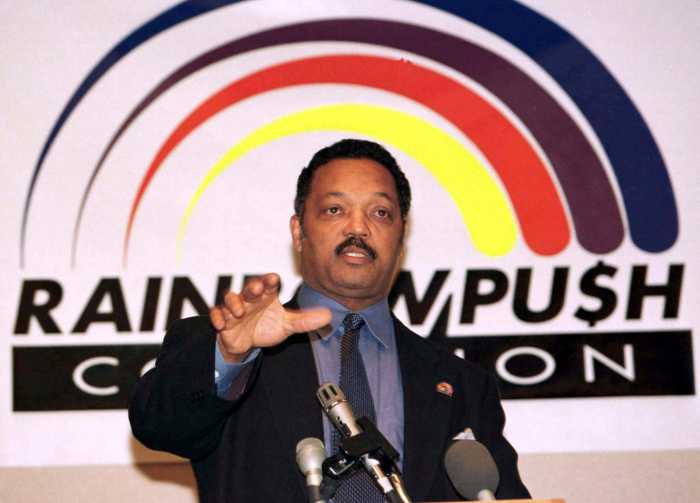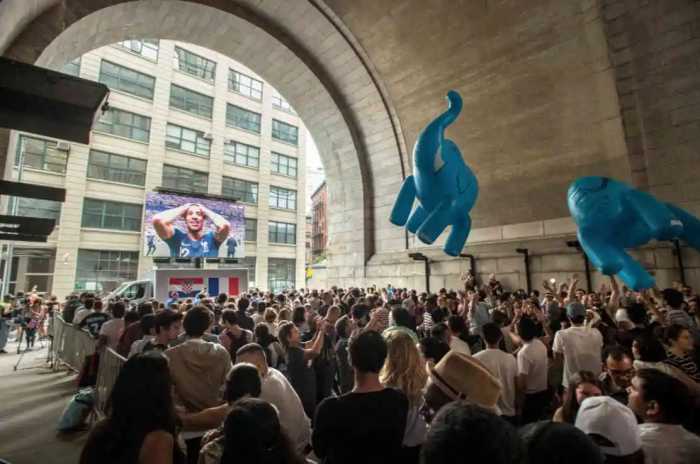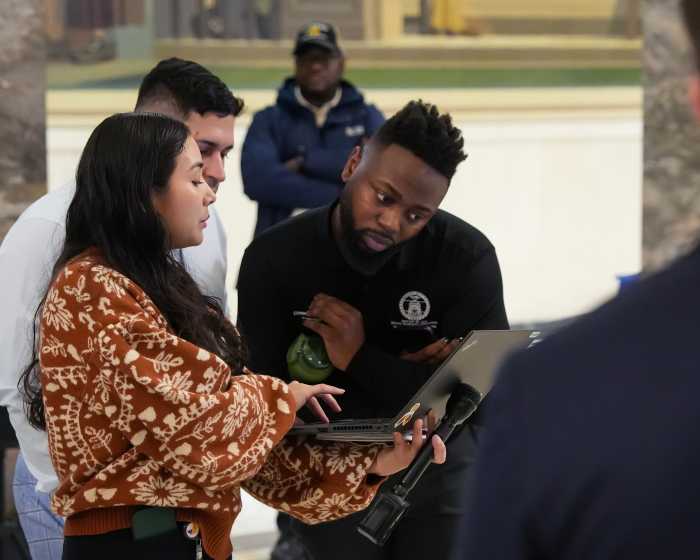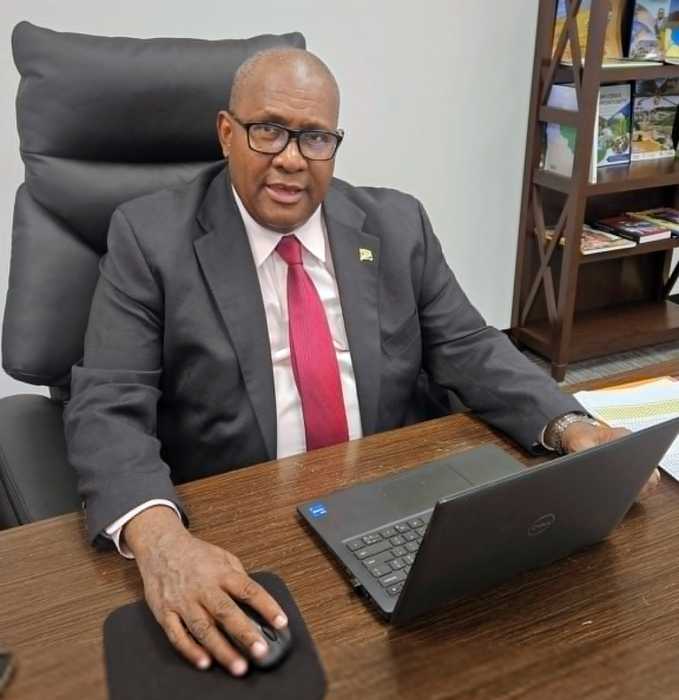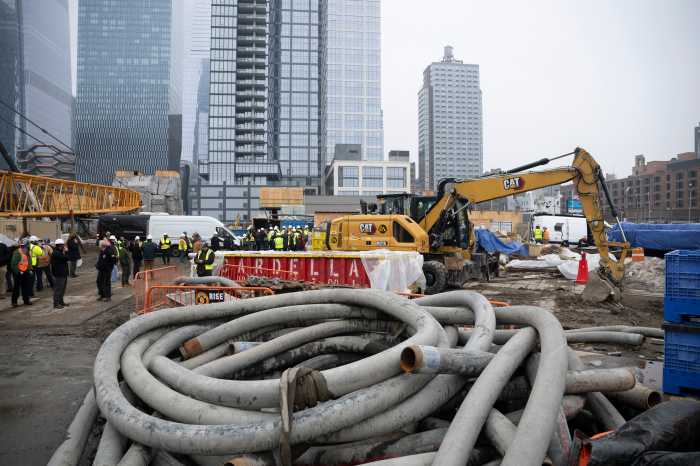“Boot camp?” inquired the attractive young woman unloading jump ropes and plastic rings, placing them around the edges of the Christopher Street pier. I nodded and introduced myself to Laura Miranda, the enterprising creator of a men’s program modeled after her successful Strong Healthy Women group. She had a shiny smile, and her blonde ponytail bobbed from her cap.
“Are you ready to get your butt kicked?” she asked. I hate that gung ho talk, even though it was partly the reason I signed up. Rather than hearing her words as a healthy challenge, I took them as a threat.
“No,” I responded, “but I’m willing to give it my best.”
“Good — that’s all we ask,” she said. Feeling apprehensive, I admitted that it had been more than five years since I exercised regularly, and even then had avoided aerobics. I was prepared — part of me hoped — for her to say that Gay Men’s Boot Camp might be too difficult for me.
“Then this is going to be a challenge,” Laura replied. As the younger 20- and 30-year-olds arrived, I wondered if I had bitten off more than I could chew.
Sporting an impressive, muscular physique for most of my life, I had let my body deteriorate for nearly a decade. Much of it was attributable to an emaciating alcohol addiction, but it continued well into my weight-gaining sobriety due to chronic procrastination. The thought of going back to my Chelsea gym on my own was overwhelming, and I couldn’t afford the attention of a personal trainer.
But when I struggled to fit into a pair of stretch jeans I had bought a year ago, drastic action had to be taken. Extremely project-oriented, I felt that immersion in a demanding training program would be the fastest and most effective way to bring about the change I desired. It worked with rehab more than three years ago — why not now with exercise?
That morning, my wakeup alarm went off at 4:30 — a ridiculous time for me, since I usually go to bed at three. I had my usual breakfast of coffee and — my last holdout of self-destruction — cigarettes. I realized it wasn’t the smartest thing I could be doing before walking to the pier for my first day of rigorous exercise.
An hour before sunrise, streetlights provided spotted illumination like candles in an empty church. I passed only three souls along the way, probably ending their evening of overindulgence. Not many years before, I was one of them, stumbling out of a club after hours of alcohol-and-drug-enhanced dancing, feeling assaulted by early-rising joggers and resentful of workaholics with attaché cases. Now I had joined the flock of the early morning faithful — at least for three days in each of the next four weeks.
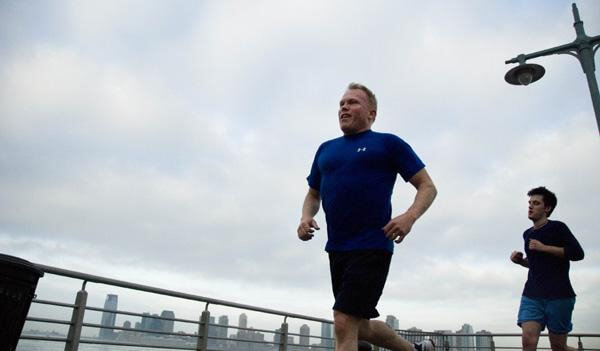
Laura’s co-trainer, Josh Garcia, a tall, sinewy young man with a warm and easygoing air, welcomed me. Before responding, I noticed a soccer ball on the ground, recalling my aversion to gym class and the competitive nature of ball-playing.
“Should I have brought my glasses?” I asked, still thinking of some excuse to handicap myself. Truth is, I have problems with depth perception, practically guaranteeing my striking out every time I swung a bat. I still panicked at the sight of any ball, whatever its size. Laura answered my question with one of her own.
“You mean you’re not ready to play dodgeball?” My eyes widened, stomach churned. She laughed, immediately earning her likability points. Then we cracked up reminding each other about the scene in “Hairspray” when Tracy Turnblad is knocked unconscious with one hit.
The levity was short-lived. “Gimme two laps around the pier, guys. Go!”
Run? Couldn’t we work up to that, like start with “walking with conviction”? The rest of the twelve men started galloping like obedient racehorses. I followed slowly but steadily. Once I completed half a lap — the rest were on their second — I was out of breath, and my ankles and shins were in pain. Laura came running next to me.
“I can’t do any more,” I puffed.
“It’s okay,” she assured me. “Just walk it off. Do what you can.”
That was the first time of many when I’d hear those words of encouragement. I eked out another half a lap, then Josh ordered me to join in the next group activity, “Tag.” Once tagged by the two men designated as “It,” players had to do jumping jacks until all the others were caught, then start all over again. So either way, the “game” made sure we kept moving. Since the dodging was the more grueling of the options, I stood on the sidelines cursing under my breath, pretending I’d been tagged by doing half-assed jumping jacks.
But even my cheating was exhausting. I fell onto the grass, started to hyperventilate, and took a couple hits of an asthma inhaler. I was relieved to notice another camper lying prostrate near the edge of the pier.
Next was an improvised obstacle course that required jumping in rings and over small hurdles and benches, followed by jumping rope, an activity in which I excelled. Non-stop action was clearly the hallmark of the program. Just when a particular body part, say the chest, was exhausted, Josh would yell, “Okay, boys, lunges across the pier.”
I took five unsanctioned rests that day. At 51, I was surprised to find out I wasn’t the oldest of the group. But at 57, Steve fared much better than I; he later described himself as a “gym rat.” Only one other in the troop, Marc, sat out as many times — I chose him as my partner. Near the half-hour mark, he joined me during one of my recovery rests and confessed he had only signed up for one day.
“I feel like an asshole,” he said. Noting that he was half my age, I tried to be encouraging. “Oh, fuck them. Who cares what they think? This isn’t a competition. This is about your personal best.” I’d later struggle to internalize my sage advice.
When I went to grab Marc for the next activity, I couldn’t find him.
“What happened to my partner?”
“He quit,” said Laura.
I began to wonder if I should or even could go on. I was in the worst shape I had ever been in my life. And with every jump, skip, and run, I was painfully reminded of it. As Laura handed out personal sets of dumbbells that we were to bring back for each session, I decided to put off my decision. I loaded my ten-pound weights in my backpack, walked to Hudson Street, and hailed a cab home.
The next morning, I received a pep email from Laura — she gave me props for sticking with it and threatened to call me the next morning if I didn’t show up. I recommitted myself.
The pain in my ankles and insteps proved to be my biggest physical challenge during the whole affair. I soon loathed the two-lap run at the beginning of the session, knowing I wouldn’t finish it. As the other men completed their warm-up, I stretched out on the sidelines, feeling frustrated and embarrassed. Laura suggested that good running shoes would help — I’d been using worn-out cross-trainers.
I followed her advice and hopped over to Jack Rabbit, a runners’ store where they monitor your stride on a treadmill and then suggest an appropriate shoe. The young woman who helped me said that others from Gay Men’s Boot Camp had come in complaining about foot pain. This was comforting news; I wasn’t unique.
While the new shoes helped, they fell short of a miracle cure. I consulted a vascular surgeon who, a month earlier, had successfully removed a plaque buildup in my right thigh. He ruled out any circulation problem, so I made an appointment with an orthopedic foot and ankle surgeon, who recommended physical therapy. Meanwhile, I continued to stretch my calves and hamstrings daily.
My mental demons were equally daunting. While boot camp promoted a surprisingly collegial environment, I still felt like I was competing, not with the others as much as my imaginary ideal self. I learned a very long time ago that nothing short of perfection was good enough. In spite of an email from Laura that said, “You’re doing great,” my neglected child interpreted it as, “You suck, but it’s my job to support you.” My healthier nature saw it as the intended encouragement it was, and I struggled to give that more credence.
I asked the other guys why they had volunteered for the program. A second guy named Steve joined in preparation for a June triathlon in New Jersey. Josh, a dancer, was preparing to perform in “Broadway Bares,” and wanted to get some cuts for his performance in the rough. Michael and Adam were hoping to lose pounds around the middle. Ryan sought strength and stamina. All of the men saw the event as a kick-start to shaping up for summer.
My most dramatic moment occurred during a human wheelbarrow race, when I had another hyperventilation scare. While my partner held up my legs, I covered ground on my hands. Grunting heavily with each “step,” I finally collapsed. Laura ran to my side. “It’s okay,” she said. “Just run it off.”
“Can’t… move,” I growled. She quietly backed off, knowing I had given my all.
Still, I improved. Eventually, I could complete most of the calisthenics, even running for short sprints through the obstacle courses. My self-recorded repetitions were lower than the others’, but the number of breaks and their duration lessened. I felt my body changing. It was harder, stronger. Friends and co-workers commented on how I looked younger.
Even my ankles and insteps weren’t nearly as pained as they had been in the beginning, thanks to Laura and Josh’s emphasis on the importance of stretching.
By using the manmade structures of the pier and the park, Laura created improvisational workouts with variety, and kept the hour-long sessions interesting and unpredictable. My favorite part of every session occurred during the cool-down minutes, when we sat in a circle, gently stretching our taxed muscles. I could finally take deep and relaxed breaths, look into the faces of my fellow campers, and notice the sun reflecting a hue of pink off the calm waters of the Hudson.
In the end, I had dropped five pounds. While Laura measured no change in my arms and legs, I had lost 4.5 centimeters — 1.8 inches — in my waist. I even caught a glimpse in the mirror of what was once a six-pack. In less than 16 hours over the course of four weeks, my body had re-proportioned.
When Laura gave out achievement awards, I received the “Most Inspirational Camper” honor. In spite of my physical and mental hurdles—or maybe because of them—I unsuspectingly managed to inspire. I left the pier feeling proud of my endeavor.
The next day, I went out and bought a pair of non-stretchable, 30-inch khakis.


